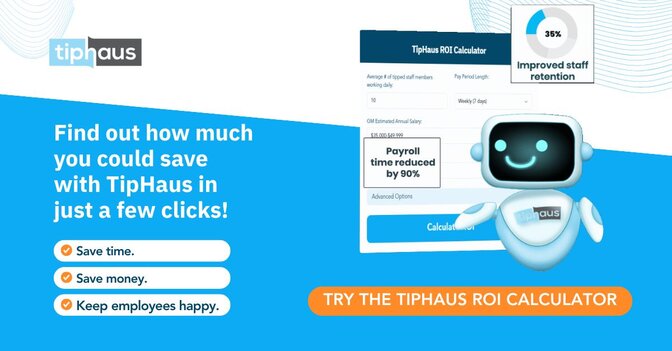
Please note: We are not a legal firm and do not provide legal advice. This article is for informational purposes only. Consult with a qualified attorney before implementing any practices discussed herein.
Tipping is central to the Canadian hospitality industry, but rules vary by province. Employers, employees, and even customers benefit from understanding how tip pooling, minimum wage, and service charges work. This 2026 guide covers:
There is no separate federal minimum wage for tipped workers in Canada. The federal minimum wage applies to employees working in federally regulated industries, such as banking, air transportation, and postal services. Canada’s federal minimum wage, which applies to those working in federally regulated industries, is adjusted every year in April based on the Consumer Price Index. The next adjustment is projected to take effect on Apr. 1, 2026, increasing to $18.10 an hour.
Unlike the United States, Canada does not have a federal 'tip credit' system that allows employers to pay tipped workers a lower base wage. Instead, most provinces and territories mandate that tipped workers receive the general minimum wage.
Each province and territory sets its own minimum wage. In most cases, tipped employees receive the same minimum wage as non-tipped employees. However, Quebec is an exception. Below outlines the current minimum wage amounts for each province and territory in Canada.
Notable provincial rules:
While most provinces and territories require tipped employees to receive at least the general minimum wage, some have additional rules regarding tip distribution and protection:

Tip pooling and sharing are common practices in restaurants and bars. These arrangements ensure that all staff members who contribute to customer service, such as kitchen staff and bartenders, receive a portion of tips. However, the legality and structure of tip pooling vary by province.
This classification is based on CRA guidelines and determines how tips are taxed and reported by employers.
Some establishments add a service charge to the bill. These fees may or may not be distributed to employees.
Many restaurants process tips through electronic payments, but credit card fees can reduce the actual amount employees receive. Some employers deduct processing fees from tips, while others cover the cost themselves. While no federal law prohibits deductions, some provinces, like British Columbia and Ontario, have banned employers from deducting processing fees from employees’ tips.
Some tipped employees also perform non-tipped duties, such as cleaning or restocking. In Canada:
Tips are considered taxable income in Canada. Employees must report both direct and controlled tips on their tax returns. Employers must also comply with CRA regulations regarding payroll deductions for controlled tips. TipHaus integrates seamlessly with all major payroll providers, making compliance and reporting straightforward and efficient.
Employers Cannot Deduct for Losses: In most provinces, employers cannot deduct tips to cover breakages, walkouts, or mistakes.
Clear Tip Policies Required: Some jurisdictions, including Ontario and British Columbia, require employers to provide clear policies on tip pooling and distribution.
Several provinces have passed laws to protect employees' rights to their tips:
With the TipHaus Employee app, team members can see a clear, real-time breakdown of their tip earnings. This transparency helps employees understand exactly how their effort translates to pay, boosting trust and engagement.
Tipping laws in Canada are designed to protect employees while ensuring fair distribution of gratuities. While tip pooling, service charges, and credit card fees can impact earnings, provincial regulations ensure that workers are compensated fairly. Employers and employees should stay informed about local labor laws to avoid disputes and ensure compliance with Canadian regulations.
Note: U.S.-specific federal reporting rules (such as OBBBA) do not apply to Canadian employers. Canadian businesses must follow CRA reporting requirements instead.
Navigating Canada’s complex and province-specific tipping regulations can be overwhelming for operators. TipHaus makes compliance simple by automating tip calculations, distribution, and reporting, ensuring fairness, transparency, and full adherence to local labor laws. Whether you’re managing tip pooling in Quebec or credit card deductions in British Columbia, TipHaus keeps you compliant while saving time and reducing payroll errors. Ready to simplify tip management? Try TipHaus free today.
Earned Tip Access is coming to Canada soon! Be the first to know when we launch it, sign up for our newsletter in the footer below!
In the meantime, see how U.S. restaurants that rely on tips are already benefiting from Earned Tip Access, reducing cash, saving time, and improving employee satisfaction:
Read the full case study
Read the full case study
Read the full case study